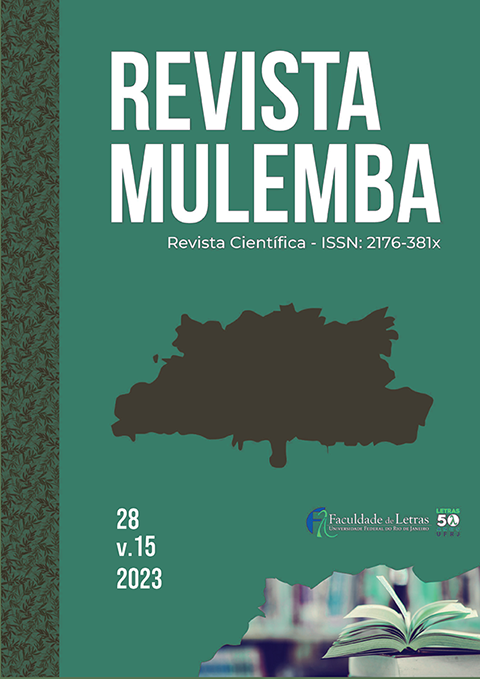Onde a voz e a letra se encontram: desafiando paradigmas com Laura Padilha
DOI:
https://doi.org/10.35520/mulemba.2023.v15n28a59098Keywords:
Laura Padilha, literatura angolana, crítica literáriaAbstract
O artigo pretende discutir alguns aspectos da produção de conhecimento acadêmico atual, sua história e suas implicações. Partimos da noção de que o artigo científico obedece a determinadas normas que impessoalizam a sua autoria e, assim, contribuem para uma percepção da pesquisa científica que não leva em conta as pessoas que efetivamente a realizam, reforçando estereótipos e posições de poder. Daí, encontramos em uma entrevista de Laura Cavalcante Padilha uma via alternativa de se pensar a produção de conhecimento escrito. A autora, estudiosa da literatura angolana, discute questões literárias e pessoais, articulando a experiência de pesquisa e a vivência intelectual num discurso denso e plurissignificativo.References
FREIRE, Paulo. Pedagogia do oprimido. Rio de Janeiro: Paz e Terra, 2021a.
FREIRE, Paulo; MACEDO, Donaldo. Alfabetização: leitura do mundo, leitura da palavra. Trad. Lólio Lourenço de Oliveira. Rio de Janeiro: Paz e Terra, 2021b.
hooks, bell. Ensinando a transgredir: a educação como prática da liberdade. Trad. Marcelo Brandão Cipolla. São Paulo: WMF Martins Fontes, 2017.
KILOMBA, Grada. Memórias da plantação: episódios de racismo cotidiano. Trad. Jess Oliveira. Rio de Janeiro: Cobogó, 2020.
PADILHA, Laura Cavalcante. “Laura Cavalcante Padilha: uma fiandeira da voz e da letra” – entrevista. In: Revista Crioula, n. 2, nov. 2007. p.1-17.
Downloads
Published
2023-10-20
Issue
Section
Other themes
License
Authors who publish with this journal agree to the following terms:
- Authors retain copyright and grant the journal right of first publication with the work simultaneously licensed under a Creative Commons Attribution License that allows others to share the work with an acknowledgement of the work's authorship and initial publication in this journal.
- Authors are able to enter into separate, additional contractual arrangements for the non-exclusive distribution of the journal's published version of the work (e.g., post it to an institutional repository or publish it in a book), with an acknowledgement of its initial publication in this journal.
- Authors are permitted and encouraged to post their work online (e.g., in institutional repositories or on their website) prior to and during the submission process, as it can lead to productive exchanges, as well as earlier and greater citation of published work (See The Effect of Open Access).

